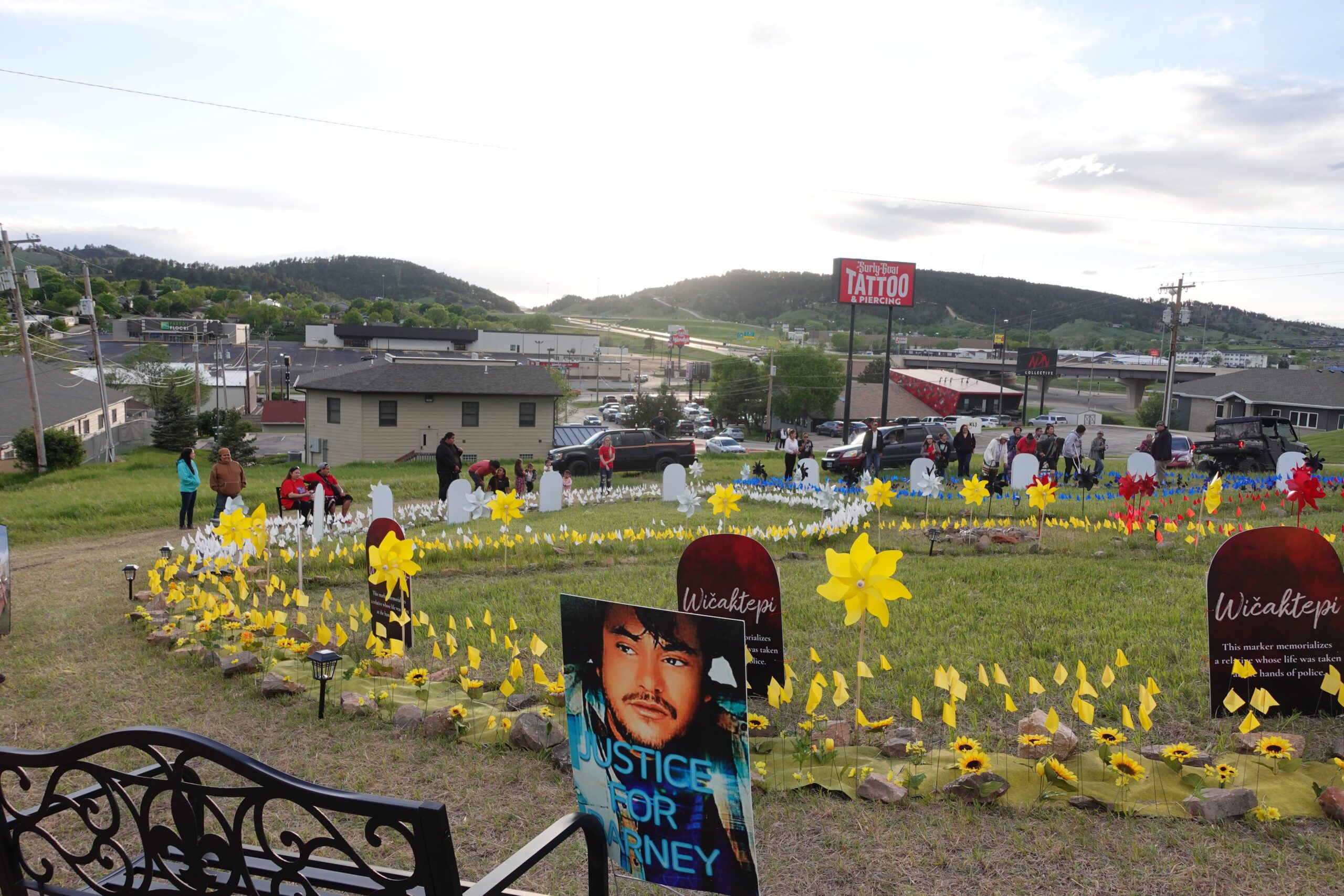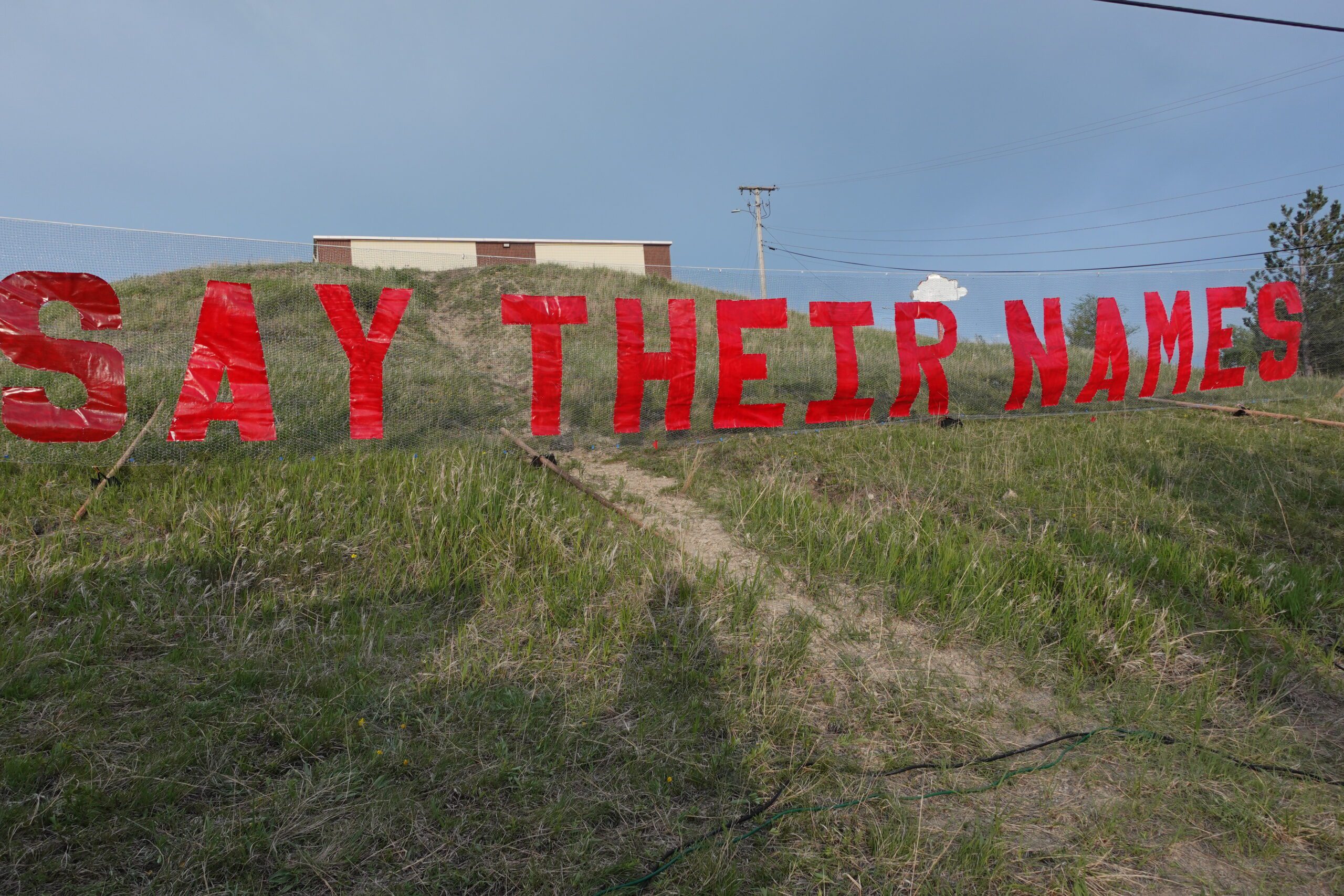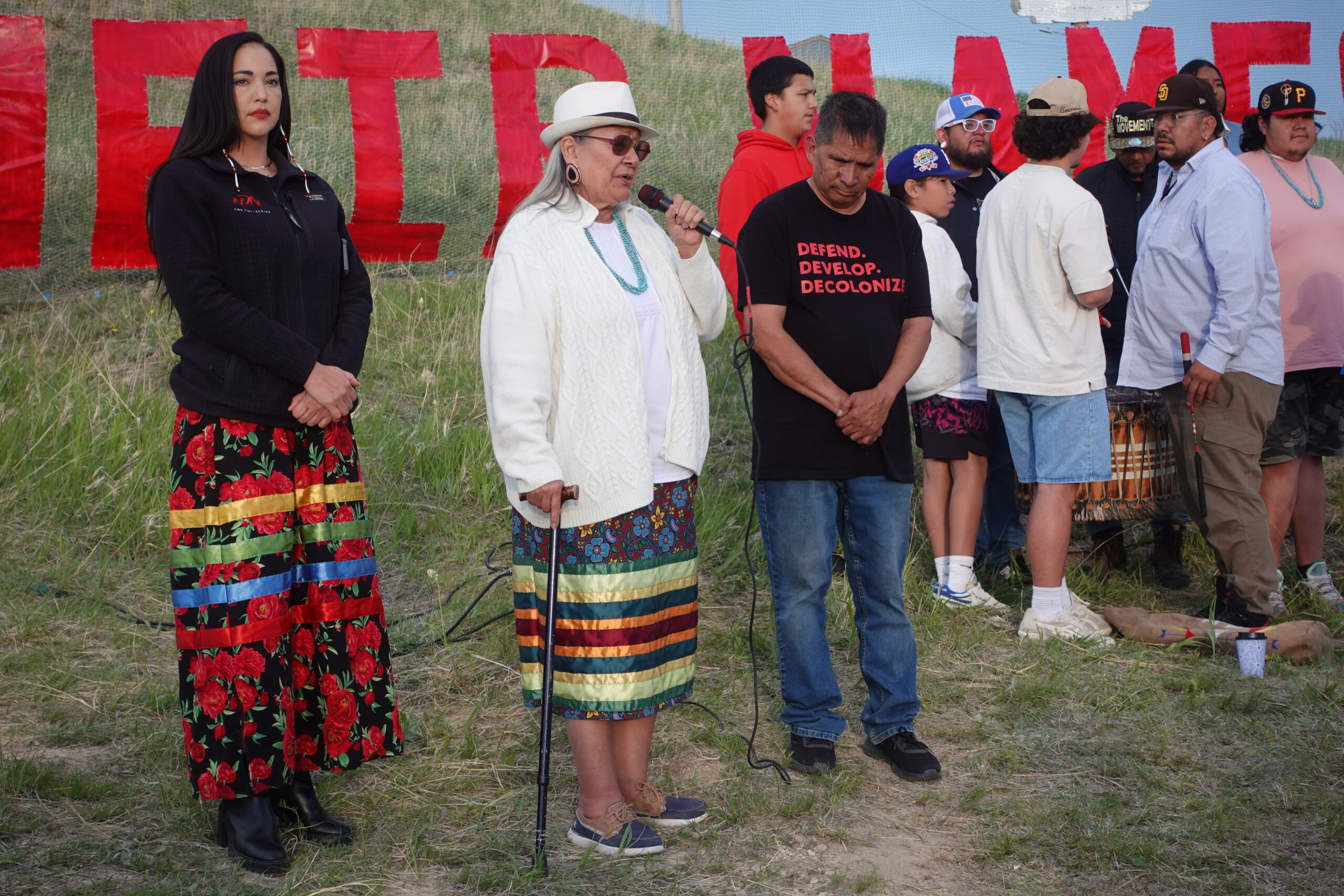Message of Remembrance Garden is large enough to see from the highway
RAPID CITY – Dark purple clouds and relentless winds threatened to sidetrack the Wicaktepi Remembrance Garden reveal on Thursday evening, but just as people arrived at NDN Collective headquarters and the event was about to begin, the wind died down and the dark clouds rolled away, leaving warm rays of sunshine to bless the project.
The Wicaktepi Remembrance Garden is a memorial space dedicated to the Indigenous lives lost at the hands of local law enforcement, emphasizing the scale of this tragedy and the importance of acknowledging it.
The Lakota Law Project says that Native Americans are disproportionately killed by police. This population also suffer from high rates of mental illness among minority populations, according to Mental Health America. The Remembrance Garden is a part of the Rapid City vs Racism campaign, to address the ongoing racism and discrimination against Native Americans through advocacy, changes in policy, police oversight, and the creation of community spaces.
South Dakota has the thirteenth highest student arrest rate in the nation. The state incarcerates Indigenous people between the ages of 15-64 ten times the rate of white people. Statistics provided by NDN Collective found that there were 79 police-involved shootings statewide from 2001-2023, and no convictions. Three-fourths of the fatal shooting victims were Indigenous, according to The Appeal, Vera Institute of Justice, Center on Juvenile and Criminal Justice and the ACLU of South Dakota.
Because of that there is a lot of trauma in the Native American community in Rapid City. NDN Collective Associate Director of Organizing Sunny Red Bear said creating the Garden has been a journey. “It began when we went to Minneapolis for some Know Your Rights training. We met up with different organizations and they took us to their Say Their Names cemetery. We were so impacted by the thoughtfulness and the healing that took place there we wanted to do that for our city. We wanted to recognize that there has been no acknowledgement, accountability, or closure in any of the deaths by police officers in the state of South Dakota. So, we wanted to create that space not only for accountability but for healing. This is to be a safe place for us to be together in community and have these conversations. These are tough conversations.”
Wicaktepi (Wee-chah-kteh-pee) in Lakota means “they were killed.” A number of victims’ families spoke through tears. The family of Barney Peoples said he was shot at least six times by Rapid City police in 2022. His sister Trinity said her brother was a nice and gentle person. “He was ambushed by police on the West side of town, who said there was a burglary in progress. They said a man had a rifle and was pointing it at them. They asked him to put it down, but he didn’t, so they shot him. That bothered me for a long time because my brother doesn’t know how to shoot a gun. He’s very traditional. He became disabled in his last years, from diabetes. He couldn’t be a burglar even if he wanted to.” She said Barney had difficulty walking because part of his foot had been amputated as had a portion of his trigger finger. “They said he had guns and was running at them, and they had no choice but to fire on him.” She couldn’t share more but she said she had just found out recently that the police had lied.
It is possible to recover from trauma, but you can never forget. It’s even more difficult to recover from trauma caused when you are unable to get justice for the event that caused the trauma. Author Sandra L. Brown is CEO of the Institute for Relational Harm Reduction and Public Pathology Education. She wrote in Psychology Today that the core of the victims’ rights movement was that the concept of judicial justice would lead to healing for the families of who’s loved ones were killed by police. Trauma caused by police brutality also has an impact on the mental health of a community. Communities who are subject to regular police brutality suffer from chronic stress, fear, and intense sadness.
Andrew Catt-Iron Shell, a local organizer with NDN Collective said he also visited the Say Their Names cemetery in Minneapolis where they honored the fallen victims of their community of police violence. “That inspired us to come home and think about how no one talks about the murders here. Once Marty Jackley (South Dakota Attorney General) says its justified then everyone forgets about it. Except the families that live through the experience, the ones that have had a loss. Often, there are children involved, moms and grandmothers that have to carry the weight of the loss. And really there’s no closure and no justice, so we are hanging in limbo with this grief.”
He said he wanted to create a spot where community members could hold vigils. “Where we could visit, where it’s not all about our trauma, but our healing. So, when I thought about gardens and how they nurture the spirit of us when we interact with nature, why not create something like that where that can happen here. When our relatives are murdered, we often go to that spot to have a shrine or something but when we go to these places to pray, often time we are harassed. There is no dignity to be able to find this closure. So now we have a safe space where we can hold vigils. Maybe do some gardening there.”
Catt-Iron Shell said that right now, the Garden is very humble in its beginnings. He described largess of the message is meant to be seen from the highway. “There’s a medicine wheel on the ground there. It’s not a sacred space but as we pray there then it will be. There’s a 70-foot banner behind the wheel, it’s very colorful. It reads ‘SAY THEIR NAMES’. The letters are five feet tall. It’s called a water banner so the wind can blow through it. You can see these big letters from I-90. There’s also a police station right up the road from the memorial. Everyone will see it. It’s a reminder to please stop killing our people.’’
Catt-Iron Shell said that the non-Native community shouldn’t be afraid of accountability and transparency. ‘’Show the body cam footage. Now, they hide behind Marcy’s Law so they don’t have to share information. Which means they aren’t accountable for their actions. That’s one of our demands. We need full transparency. We need third party investigations. We need the Department of Justice to look this community just as they have in other communities.”
(Contact Marnie Cook at cookm8715@gmail.com)
The post Message of Remembrance Garden is large enough to see from the highway first appeared on Native Sun News Today.



